Scotland's block grant from Westminster cut by £309m
- Published

The Scottish government will have £309m deducted from the block grant it receives from Westminster next financial year.
It is due to an over-estimate made two years ago in the amount Scots pay in income tax.
Holyrood ministers have to budget on the forecasts given to them by the independent Scottish Fiscal Commission.
The real figures are later reconciled with cuts, or potentially additions, to the block grant.
Why was there an overestimate?
In 2017 the Scottish government's income tax powers were new, and there was limited detail on previous tax years to show how much had been paid by Scots.
The Fiscal Commission drew on data from the Office for Budget Responsibility and made its own assumptions about Scottish tax.
Its estimate, in late 2017, of more than £12bn from income tax for 2018-19 was significantly higher than the amount then collected.
The Commission later revised its figure, and in February this year, it estimated the adjustment required to reconcile the changes would reach £555m.
The final out-turn figure was published on Wednesday by HM Revenue and Customs (HMRC), and came to £11.56bn, leaving a reconciliation to be applied to the 2020-21 budget of £301m.
The HMRC figures also showed that Scottish income tax revenue - which does not include dividend or savings income - grew by 5.9% in Scotland during the 2018-19 financial year. The equivalent non-savings, non-dividend income tax figure for the UK saw 4.2% growth.

Derek Mackay introduced a major shake-up of tax bands when he was finance secretary
That was the year when the then finance secretary, Derek Mackay, introduced a major shake-up of tax bands, using the newly devolved powers to introduce a five-band income tax system.
That tilted the tax bill towards those on higher incomes, while raising each rate of existing tax band by 1 pence per pound. Following the reconciliation, it is now clear that raised an additional £119m - a relatively small increase when set against a lot of reform, and under political fire.
Conservative critics argued that the SNP administration was making Scotland the highest taxed part of the UK. Mr Mackay responded that the "starter rate" of tax also made it the lowest taxed for a small numbers of lower earners.
HMRC data show the amount raised from high earners in Scotland during 2018-19 was a much lower share of the total than at UK level, mostly because a smaller share of Scots are very high earners. Only 15,000 Scots were paying 46% tax on income of more than £150,000, and they contributed 17.4% of the total.
In tax figures for the rest of the UK, 332,000 tax payers in the top band raised 31% of the total.
The number paying "higher rate" tax, on earnings above £43,430, accounted for 41% of Scottish earnings, while it was 35% across the rest of the UK.
The number of Scots in that tax bracket rose from 308,000 to 322,000 earners, out of a total 2,524,000 income tax payers in Scotland.
A spokesperson for the Scottish government said: "The reconciliation is a normal annual part of the fiscal framework, where differences between forecast and outturn are reconciled once outturn figures are published.
"This figure is not a useful indicator of how Scottish Income Tax performed in 2018-19 as receipts grew by £640m between 2017-18 and 2018-19".
But there was an attack from Jackie Baillie, deputy leader of Scottish Labour, who said that the £309m deduction represented "a black hole" in ministers' plans, adding in the expected deduction in block grant that will be required for 2019-20.
Kate Forbes, the finance secretary, has said that she planned around 24 September to publish an autumn budget update, which should show how spending has changed over recent months, most of that due to measures to deal with the pandemic.